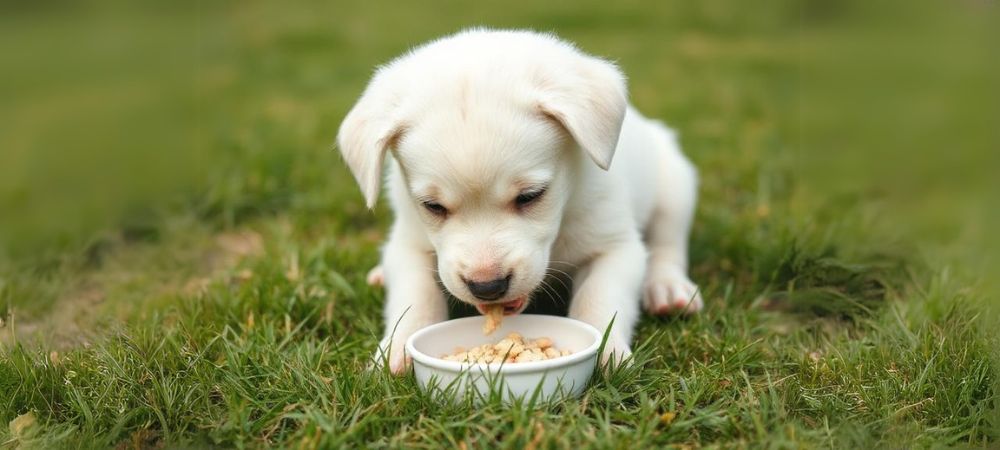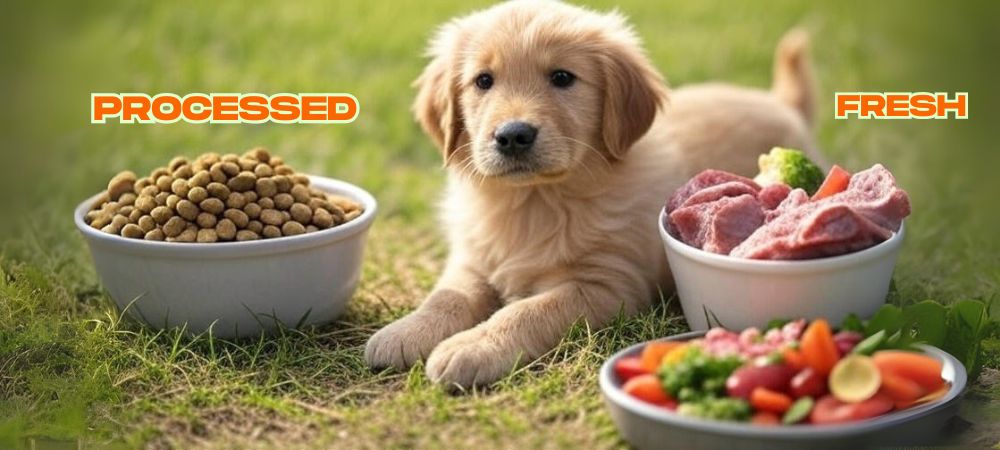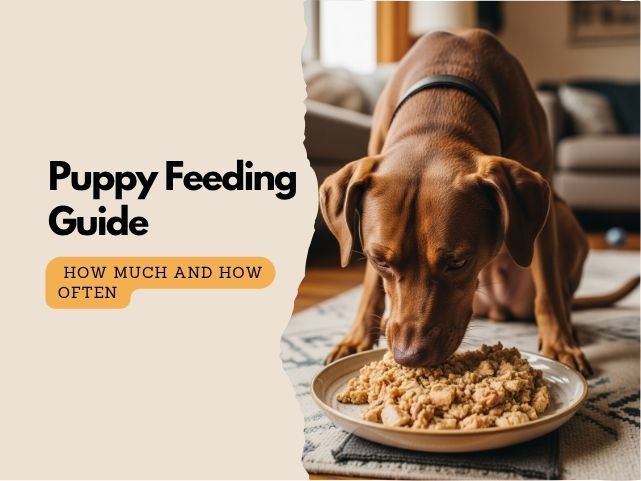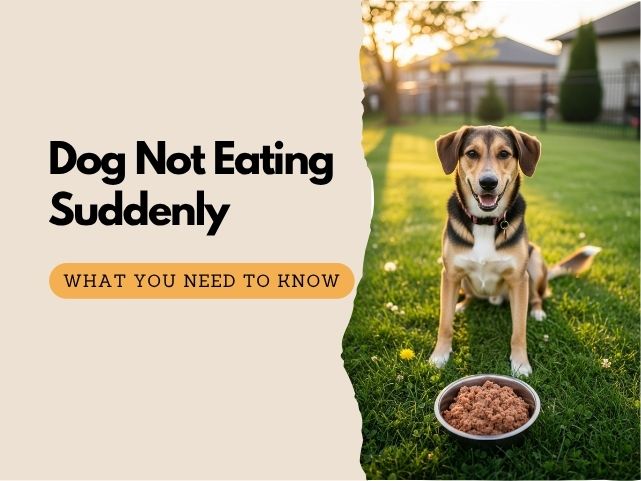Quick Summary
Dogs are a great addition to any household, and puppies even more so, as their energy and playfulness bring joy to adults and kids alike. Alongside being an exciting addition to your family, puppies can also be overwhelming at times, and one of the most significant issues many people run into is not knowing how much to feed a puppy.
Puppies grow even faster than human kids, and they need the right fuel to support this rapid growth. Based on experts’ advice, this guide walks you through exactly how much, how often, and what type of food your puppy needs.
Why is a Feeding Schedule Important?

One of the biggest mistakes people make when feeding puppies is treating them the same as adult dogs. Puppies have completely different nutritional needs from adult dogs. They generally need more protein and more calories per day, and given their small size, you also need to feed them more frequent, smaller meals.
A puppy feeding schedule ensures your puppy gets the right food at the correct times. A schedule for puppy feeding will also ensure your puppy is not getting more food than it needs. Overfeeding can be just as harmful as underfeeding for puppies, as they often lack self-control.
Traits to Consider When Preparing a Feeding Schedule
Breed and Size
There are many dog breeds out there, and the food and nutrition each breed needs can vary. The amount of food a Beagle or a Chihuahua puppy needs completely differs from what a Great Dane puppy needs.
Age
The age of the puppy is another very important factor to consider. Younger puppies generally need food more frequently than older ones, as their stomachs can hold less food. A 4-week-old puppy’s feeding schedule will look very different from an 8-week-old puppy’s. You need to give even more attention to a newborn puppy’s feeding schedule, as they require the most attention.
Activity Level
More active puppies will generally need more food as they burn many more calories. The activity levels for puppies can vary depending on breed, age, and personality. Some puppies are just more active and playful than others. These factors are essential when considering how much food to feed a puppy.
Best Puppy Food Options: Processed vs Fresh Food

The type of food you give your puppy is also essential, as it can affect the frequency and the amount of food you need to provide.
Processed Food
Feeding processed dog food, such as kibble or canned/wet food, may be convenient, but it’s not the best choice, especially for puppies. While these options are common due to their ease, they often lack the nutrients and quality that fresh, real food provides. Puppies, in particular, need proper nourishment to grow strong and healthy. Choosing fresh meals made with natural ingredients ensures your puppy gets the best start in life, setting them up for a lifetime of well-being. It’s an investment in their health that pays off in the long run.
Fresh Food
Fresh pet food is the ideal choice for puppies, providing them with the nutrients they need to grow and thrive. Unlike processed options, fresh pet food is made with high-quality, natural ingredients that support optimal health and development. Puppies have unique nutritional needs, and feeding them fresh, balanced meals ensures they get the right combination of proteins, vitamins, and minerals for strong bones, healthy muscles, and a vibrant immune system. By choosing fresh pet food, you’re giving your puppy the best start in life, setting the foundation for a long, healthy future.
You can check out our Meal Tips for Normal & Picky Eaters guide for a detailed look at introducing food for picky eaters and puppies.
Common Feeding Mistakes and Tips on How to Avoid These Mistakes
- Free-Feeding: Leaving food out all day can lead to overeating and bad potty habits. Stick to scheduled meals, as puppies will eat anything you put in front of them.
- Too Many Treats: Treats add up a lot, which can be bad for puppies, as they will always want treats, and it comes down to the owners to limit the amount of treats they get. Treats should comprise less than 10% of a puppy’s daily food intake.
- Gradually Transitioning to New Food: When changing your puppy’s food, it’s important to transition gradually over 7 to 10 days. A sudden switch can cause digestive discomfort or make your pup hesitant to eat. For helpful advice on making the transition smooth and easy, check out our guide for picky eaters.
- Not Reading Labels: Every food is different—always check the feeding guide and ingredients.
- Feeding Adult Food Too Soon: Puppy food is rich in the nutrients they need for growth. Don’t make the switch too early.
When to Switch to Adult Dog Food
The two most obvious signs to look for when considering the switch from puppy food to adult food are a slowdown in growth and a change in appetite. If both signs are apparent, you can start switching your puppy from puppy food to adult food over a seven to ten-day period.
Puppies that belong to smaller dog breeds will want to switch to adult food earlier as they grow faster. A general rule of thumb is:
- Small breeds: Around 9 to 12 months
- Medium breeds: About 12 months
- Large/giant breeds: Anywhere from 12 to 24 months
Of course, this can vary from dog to dog, and the best way to make sure if the time is right for the switch over to adult food is by communicating with your puppy’s vet.
Conclusion
Feeding a puppy is not just about filling up their stomach, it’s about creating a balanced diet that can help them lead a healthy and fulfilling life, keeping them safe from diet related issues like weak bones and obesity.
Sticking to a feeding schedule makes your life much easier, too, as you can better manage your puppy’s diet. You will always want to give your puppy the best food you can buy, and if you are in Saudi Arabia and are looking for high-quality Puppy food, make sure you check out Soluky Pet. Soluky Pet is a premium pet food retailer that sells high quality pet food for dogs and cats, making it a go-to shopping destination for all pet owners.
FAQs
Q: Can I give my puppy people food?
A: Some whole foods (like cooked carrots or plain chicken) are okay in moderation. Avoid onions, chocolate, grapes, and anything seasoned or spicy.
Q: What if my puppy eats too fast?
A: Try a slow-feeder bowl or puzzle toy to help them pace themselves.
Q: How do I know if I’m feeding enough?
A: Watch their body shape, not just the scale. You should feel ribs, not see them.
Q: My puppy skips a meal—should I worry?
A: Occasional meal skipping isn’t a big deal, especially during teething. If it lasts more than a day, call your vet.

 You Might Also Like
You Might Also Like

